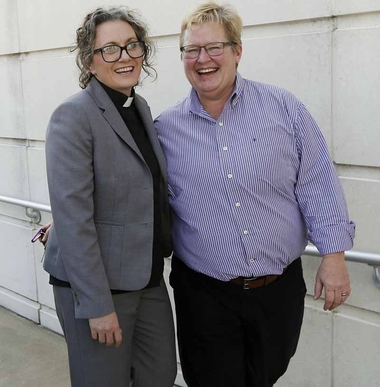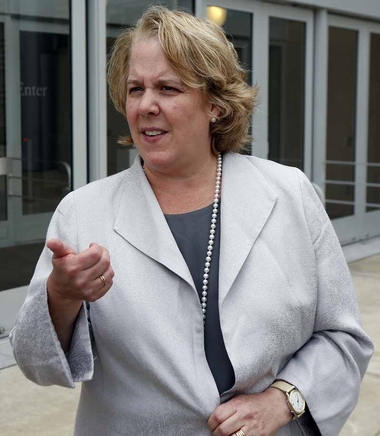Mississippi LGBT religious objections law argued on appeal

Jackson, Miss. (AP) — A lesbian couple from Mississippi traveled to Texas and spent their second wedding anniversary watching arguments in a court case that they believe could affect whether they face officially sanctioned discrimination in their home state.
Brandiilyne Mangum-Dear said she and her wife, Susan Mangum, were married in California in 2015, a few weeks before the U.S. Supreme Court legalized same-sex marriage nationwide. The Mississippi Legislature in early 2016 passed a law that would let merchants and government employees cite religious beliefs to deny services to same-sex couples.
Gay and straight plaintiffs sued the state of Mississippi, and a federal district judge halted the law before it could take effect in July 2016, ruling that it unconstitutionally establishes preferred beliefs and creates unequal treatment for LGBT people.
The law started as House Bill 1523 . It would have allowed clerks to cite religious objections to recuse themselves from issuing marriage licenses to same-sex couples, and would have protected merchants who refuse services to LGBT people. It could have affected adoptions and foster care, business practices and school bathroom policies.
"We should have the right to celebrate our anniversary in any establishment we choose, and we should hold hands without fear of being humiliated and asked to leave. That's what HB1523 does," Mangum-Dear, who lives with her wife in Hattiesburg, said in a phone interview Monday.
She spoke from Lubbock, Texas, where the three judges from the 5th U.S. Circuit Court of Appeals heard arguments. The court handles cases from Louisiana, Mississippi and Texas.
The Mississippi law championed and signed by Republican Gov. Phil Bryant sought to protect three beliefs: marriage is only between a man and a woman; sex should only take place in such a marriage; and a person's gender is determined at birth and cannot be altered.
Roberta Kaplan, one of the attorneys who sued to block the law, said in a phone interview after the arguments that the idea of neutrality is at the core of the First Amendment and that government may not establish a religion or prohibit the free exercise of religion.

"It explicitly endorses three religious beliefs that take one side of the debate about same sex marriage," Kaplan said after the court hearing of the law.
Mississippi Democratic Attorney General Jim Hood declined to appeal the ruling that blocked the law from taking effect. The governor's appeal is being handled by private attorneys, including some working for Alliance Defending Freedom, an Arizona-based Christian legal group that helped to write the law.
"We made arguments to the court that this particular law does not impose anything on the plaintiffs. It actually protects people who don't want to fear government discriminating against them because of their beliefs," Kevin Theriot (TAIR-ee-oh), an attorney for Alliance Defending Freedom, said in a separate phone interview. "It is a good law. It is an accommodation of religious convictions, and we have a long tradition of that in this country."
As of June 2016, more than 100 bills were filed in more than 20 state legislatures across the nation in response to the June 2015 U.S. Supreme Court ruling legalizing gay marriage, UCLA law professor Douglas NeJaime testified in June during a federal district court hearing on the Mississippi law. NeJaime said Mississippi was the only state to enact a law listing specific beliefs to be protected.
Robert McDuff, an attorney for some of the people who sued to block the law, said he hopes the appeals court will affirm U.S. District Judge Carlton Reeves' ruling.
"The fact that we were able to stop this bill from going into effect last summer was itself a great victory," McDuff said. "Many Mississippians came together in opposition to this bill."
By Emily Wagster Pettus, Associated Press. Copyright 2017 Associated Press. All rights reserved.
The Gayly – April 4, 2017 @ 1 p.m.





